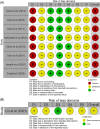Comparative Safety of Medications for Severe Agitation: A Geriatric Emergency Department Guidelines 2.0 Systematic Review
- PMID: 40275439
- PMCID: PMC12460960
- DOI: 10.1111/jgs.19485
Comparative Safety of Medications for Severe Agitation: A Geriatric Emergency Department Guidelines 2.0 Systematic Review
Abstract
Background: Managing undifferentiated, severe agitation in older adults may require antipsychotic or sedative medications to prevent harm to self or others. Unfortunately, these medications are associated with serious adverse events in older adults, and little is known about their comparative safety.
Methods: We conducted a systematic review to identify comparative effectiveness studies on the safety of medications used in the treatment of severe agitation among older adults in the prehospital or emergency department (ED) setting. We searched eight databases including PubMed, EMBASE, SCOPUS, Cochrane library, CINAHL, Proquest Central, Ageline, and PsycInfo published in or before February 2024. Studies were included if they examined 1st generation antipsychotics, 2nd generation antipsychotics, benzodiazepines, or ketamine. Data were extracted on adverse respiratory events (apnea, hypoxemia, intubation) and other adverse events (arrhythmia, hypotension, worsening delirium, cardiac arrest, and mortality). We report the aggregate occurrence of any adverse events pooled by drug and report odds ratios (ORs) using haloperidol as the reference group.
Results: Among 8600 studies identified, eight observational studies and one randomized clinical trial met eligibility for further qualitative and quantitative analysis. The observational studies included 838 older adults receiving haloperidol (n = 117), droperidol (n = 129), lorazepam (n = 350), midazolam (n = 68), olanzapine (n = 101), quetiapine (n = 56), and ziprasidone (n = 17). Any adverse events were observed in 16.8% of the patients (141/838). Adverse events were most common among patients receiving midazolam (53%; 36/68). Relative to haloperidol, midazolam significantly increased the risk for any adverse events (OR 5.25 [95% CI: 2.64-10.45]). Quetiapine was the only drug observed to have a lower frequency of adverse events (OR 0.27 [95% CI: 0.08, 0.97]).
Conclusions: Adverse drug events are common among older adults receiving antipsychotic or anxiolytic medications for severe agitation. Benzodiazepines, particularly midazolam, pose an excessive risk to older adults requiring pharmacologic treatment for severe agitation.
Keywords: agitation; antipsychotics; anxiolytics; medication safety; older adults.
© 2025 The Author(s). Journal of the American Geriatrics Society published by Wiley Periodicals LLC on behalf of The American Geriatrics Society.
Conflict of interest statement
The authors declare no conflicts of interest.
Figures
References
Publication types
MeSH terms
Substances
Grants and funding
LinkOut - more resources
Full Text Sources
Miscellaneous



